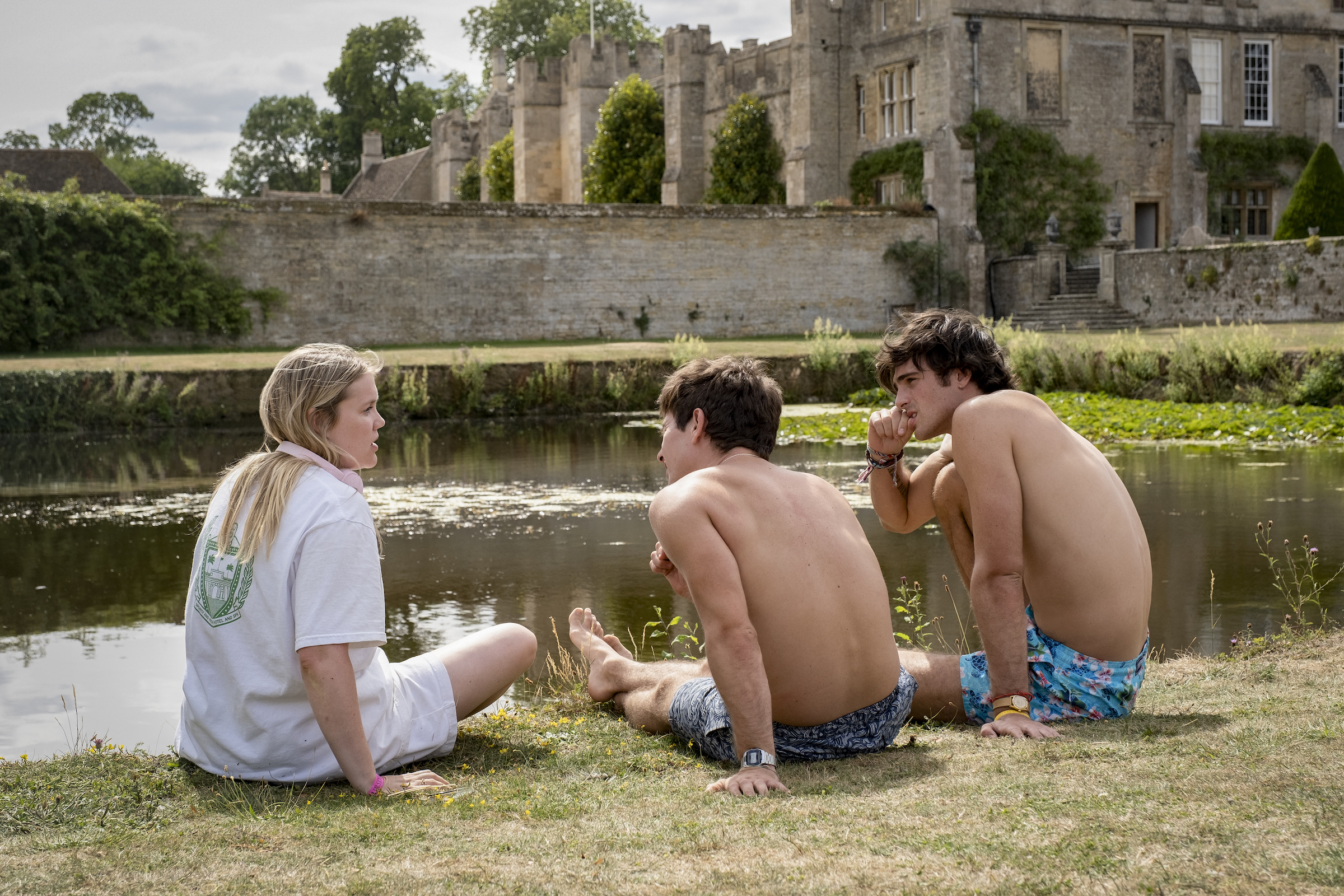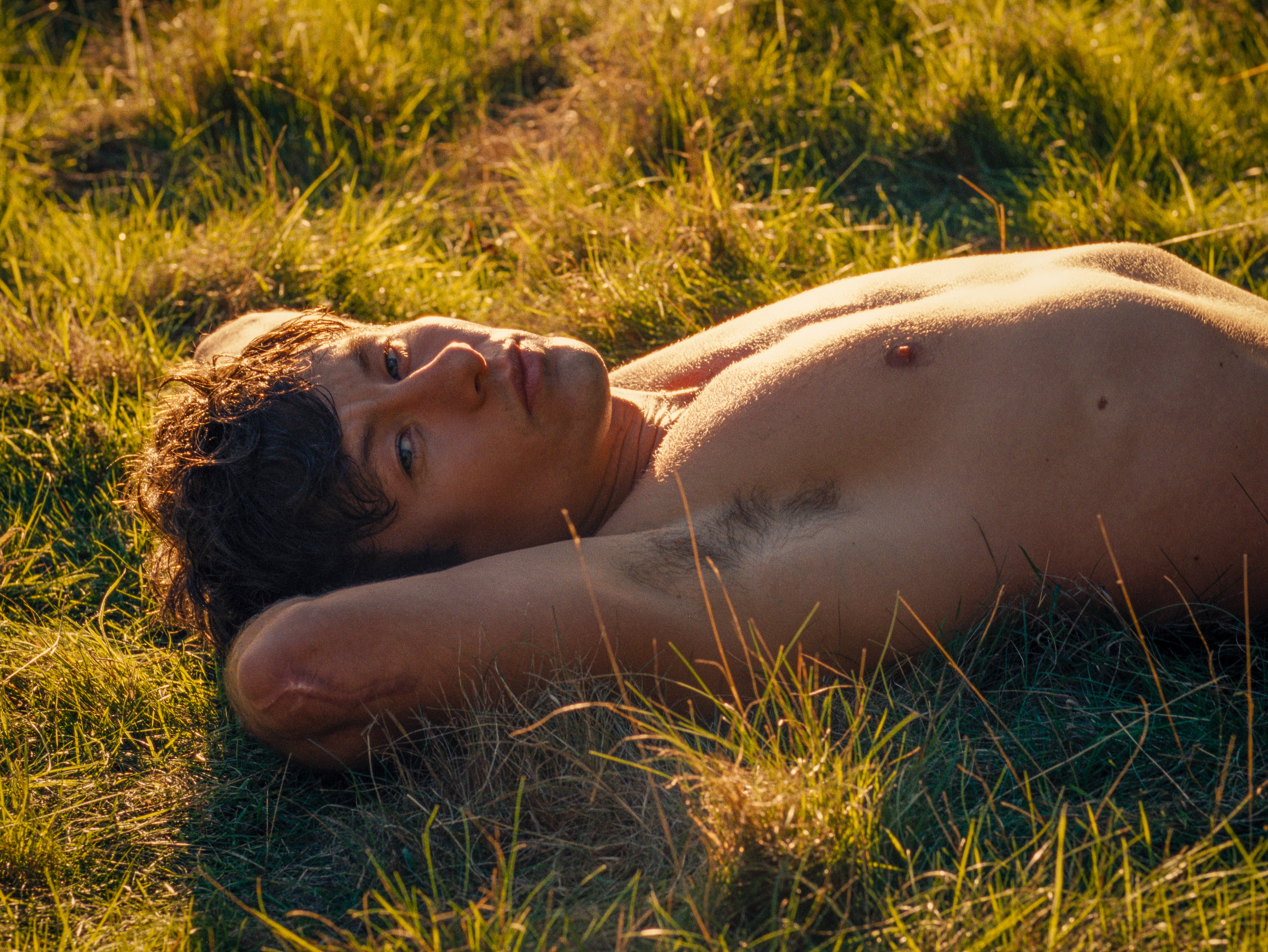Warning: This post contains spoilers for the movie Saltburn.
“I don’t set out to be provocative,” says Emerald Fennell, the Oscar-winning writer-director of 2022’s Promising Young Woman and the newly released English stately home satirical thriller, Saltburn. “I just set out to be honest, and I think that can be confronting.” Saltburn’s eponymous estate is sumptuous, but the movie, which had its premiere at the Telluride Film Festival, and goes wide in cinemas on Nov. 22, does not hold back on the discomfiting nature of life among the wealthy.
A house party is no fun without interesting guests, and Fennell has amassed an intriguing crew. Barry Keoghan, who was nominated for an Oscar earlier this year for his turn in The Banshees of Inisherin, plays Oliver, the newcomer to the life of the ultra-wealthy. Euphoria’s Jacob Elordi is Felix Catton, the blithe friend who invites him in. Archie Madekwe plays a fellow freeloader and Rosamund Pike and Richard E. Grant are the eye-wateringly wealthy hosts (and Felix's parents). Plus, there’s a hilarious turn by Promising’s star Carey Mulligan. Fennell spoke to TIME about her approach to the film and the scenes most likely to inspire spirited discussion on the way out of the theater, involving bathwater, blood, buried remains, and, as she might say, bollocks.
TIME: Do you want your work to provoke anxiety in people?
Fennell: Well, I hope what mitigates that a little bit is that they are comedies. Dread is a huge thing that I'm interested in. I like to apply pressure and then ease it. There has to kind of be a sword of Damocles, that you don't know when it's going to drop. I think that's the thing that makes something feel vital. And you know, anxiety is a difficult one, because obviously, it's not a nice feeling. But maybe that's the experience of being a woman, is that any room you're in, anyone you're talking to, it could take a turn at any second. You're living with that. I think maybe that is part of the way I see the world.
You show how ghastly the Catton family is, but then you put them through the wringer in a way that generates sympathy. Which side do you want the audience to take?
I don't believe in taking sides. I don't believe in moral judgment. The thing about the family is, we are supposed to love them. We should get that feeling that even if it is against our better judgment, we are completely seduced by them. They're like everyone; they are delusional and not as self-aware as they could be. They're cruel and capricious, they have a whisper-soft power that they use cruelly, but you know, they're also people. I don't think anything is effective if you don't both like and dislike people in equal measure; that's what the people in our lives are like.

Several key scenes take place in the bathroom. Why the bathroom? Was there a bathroom at that house that inspired you?
The first image I thought of in the movie, the inspiration for it, was Oliver saying ,"I wasn't in love with him," and then licking the bottom of the bathtub [after Felix uses it]. We built that bathroom and that bath. But I think it says so much about the kind of world that we're operating in, in this big country house, that the bath is in the center of the bathroom. It's sort of designed to be watched. These houses are built for voyeurism because the staff need to be able to see but not be seen. There are multiple doors and mirrors in every room, so you can slip in and out. There’s such erotic tension to that but also kind of horror because you're being seen doing the wrong thing. The bathroom felt like a very good metaphor for that: the place where things were private but also public.
When you thought of him licking the drain, were you looking for something shocking?
I don't think it's shocking; it's incredibly sexy. To me the bathtub is just an incredibly erotic scene. It is all the things that something stirring should be, which is funny and intimate and shocking and revolting and unbelievably sexy. What I was trying to make with this film was something that felt actually true about the nature of desire. For desire to really take you in its grip like it does in this movie, it has to be to a certain degree transgressive. It has to be something you wouldn't necessarily want people to see.
So in your mind lust and revulsion are very tied together?
Catherine Breillat, who I'm obsessed with, put it best. In Romance she says that beauty thrives on degradation and that sexual tension isn't between two people, it's between desire and revulsion. That tension is what the whole film is about. It’s about our relationship with the things we want and how sado-masochistic that can be.
Is there a similar tension playing out in the scene where Oliver humps Felix’s grave? Is that about lust, or grief, or are they also linked?
It's about grief. It's about love. It's an attempt to get some form of impossible closure. And the reason that scene is so long is because we needed the whole emotional journey. It's an attempt at something that is totally futile; Oliver himself understands how absurd and appalling and ridiculous is the position he's in. There's a scene in Wuthering Heights after Cathy dies when Heathcliff digs down to her coffin and tries to get to her. It’s very clear what he's intending to do, which is to, at the very least touch her, kiss her. So it's part of the Gothic tradition that sex and death are kind of intertwined.
There's still a bit of a taboo around menstrual blood as an erotic device. We’re not that far from the days of Carrie where it’s more about horror than desire. What was the inspiration for that scene?
This film is about Oliver and how he gets inside, literally and metaphorically, and what we see is his genius for seeing what people really want and giving it to them. We've seen the narrative he's built for himself that makes Felix want to be his friend. We then see him ingratiate himself in the house as best he can, we see his aborted attempt to seduce Elspeth, Felix's mother, which then turns into a different kind of seduction, where he gives her what she wants, really, which is to be told she's a good person. And she tells him that her daughter is a masochist and has an eating disorder. That’s the information that he takes into the next scene, telling Venetia that her body, rather than something disgusting, is in fact beautiful and arousing. Menstrual blood still is something that people are squeamish about. But I think actually, it's an incredibly effective sex scene because he’s worshiping her body, and everything that her body produces, and that's not something that anyone has ever done for her before.

In the closing scene, where Oliver dances naked, is the nakedness about communicating joyful abandon or "Wow, this is a really creepy guy….”?
It's joyful, but it's also an act of desecration. And it's an act of ownership and territory establishment. It's his now. Nothing says it's his like dancing through the house naked. It’s a moment of gleeful abandon and joy, but it's also very solitary. It also ends with him alone with the stones, and the Catton [puppet] theater. This film is also about the audience, our relationship with these characters, how complicit we are, how far we're willing to be led. I love all of the characters, but I am also on Oliver’s side. And I think the thing that is effective about the song, the dance, the beauty, the complication and the detail of the shot is that you can't leave it not kind of loving Oliver, and not feeling that your blood is up. And that's what this film is about. It's about what turns us on.
Are there any scenes to which the audience response has surprised you?
No. What I knew I wanted going into it, and what we all tried to do while making it, is for it to be a kind of visceral experience that is felt as much as understood. And it's a similar response, honestly, to Promising Young Woman, which is that there is a certain amount of squirming and there are moments when the audience responds completely differently to the same scene. Some people can be squealing, some people can be angry, some people can be disgusted, some people can be turned on, some people can be laughing awkwardly, some people could be laughing with joy, and every single person in that room disapproves of everyone else's response, and finds it completely impossible to understand. It isn't just about the connection of the film with the audience, but about their connection to each other.
What do you imagine the future for Oliver to be?
Well, Farleigh [Madekwe's character] is still around somewhere. Duncan [the butler] knows. The way that Duncan looks at Oliver at the final funeral is clear. He didn't cover his tracks enormously well. And you can't win. You can't really get in. So you know, it will be a Pyrrhic victory I think. Whether it means that he lives there alone for the rest of his life or not, he didn't get what he wanted. You know, not really.
I've noticed that the roles that you take on in acting—Midge in Barbie, Camilla in The Crown and to a certain extent Vanessa Bell in Vita and Virginia—are also not quite in, like Felix. Midge is the Barbie that wasn't successful. Camilla is in the Royal family but not really, and Vanessa is a Bloomsbury but not one we all remember. Is there something about people who are trying to get to the inner circle, that is core to the way that you want to talk about the society we live in?
You know, I wish I was able to choose roles with such perception. I certainly was very, very interested in Camilla because of the disconnect between the way that people see someone and how they really are. And that felt very profound when it came to her. But I think honestly so much of my acting work is because other people have perhaps seen that thing. I mean with Midge, it was more than I'd been seemingly permanently pregnant. So it was quite funny to make me pregnant again.
Bonus Q: Did you write Carey Mulligan's character with her in mind?
I didn't. She read the script as my friend and asked if she could play Poor Dear Pamela. It needed somebody who would take her seriously. You know, because she is very important, Poor Dear Pamela. She's the human debris.
More Must-Reads From TIME
- The 100 Most Influential People of 2024
- Coco Gauff Is Playing for Herself Now
- Scenes From Pro-Palestinian Encampments Across U.S. Universities
- 6 Compliments That Land Every Time
- If You're Dating Right Now , You're Brave: Column
- The AI That Could Heal a Divided Internet
- Fallout Is a Brilliant Model for the Future of Video Game Adaptations
- Want Weekly Recs on What to Watch, Read, and More? Sign Up for Worth Your Time
Contact us at letters@time.com